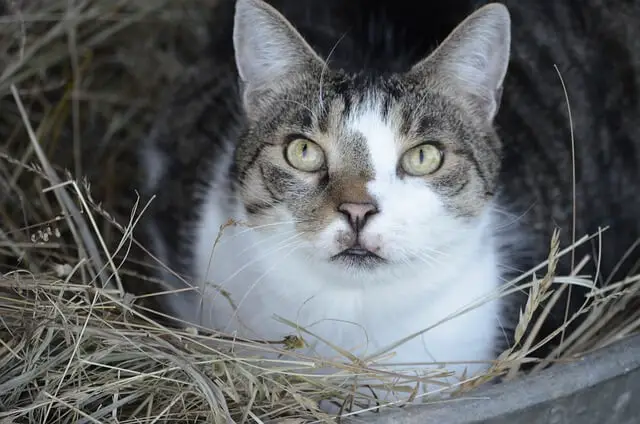Kidney Stones In Cats - How Dangerous Are They?
08.12.2022.
Kidney stones are “stone-liked” deposits made of crystals and salts in urine that are formed inside the kidney. They usually don’t present symptoms until they grow large, irritate the kidney ductus, and potentially cause obstruction or infections.
What are kidney stones?
Kidneys remove waste, mineral salt, urea, and toxins from the blood and make urine. When there is too much waste of blood and the organism is not producing enough urine, crystals begin to form in the kidneys.
These crystals attract other wastes and chemicals to form a hard formation that will grow larger unless it is passed out of the organism by urine.
There are four types of kidney stones:
- calcium oxalate
- uric acid
- struvite
- cystine
Kidney stones in cats are not considered complex, meaning they should not be removed. Stone recurrence also is common. Kidney stones (rare in cats) usually cause no signs unless the kidney becomes inflamed or the stones pass into the ureter. If a ureter becomes blocked by a stone, it can cause vomiting, depression, or pain in the abdomen in the area around the kidneys.

RELATED: Kidney Failure in Cats: Causes, Symptoms & Treatment
Causes of kidney stones
There are many reasons and risk factors for the development of kidney stones. The most common reasons are
- increased calcium levels
- alkaline urine pH
- underlying kidney disease
- urinary tract or bladder infection
- dehydration
- genetic defect
- urinary retention
- some medications or medical conditions
- eating a lot of protein
- polycystic kidney disease
Although there are no age or sex predispositions, some studies have shown that neutered males are more predilected for the development of kidney stones; likewise, some breeds are more susceptible to kidney stones, such as
- domestic shorthair, and longhair
- Persians
- Siamese
- Himalayan
- Ragdoll
- Burmese
There are several types of kidney stones; every type is attributed to different ways of forming.
Symptoms
Small kidney stones usually do not present symptoms, and according to that, they are detected incidentally. Once they grow (inflammation of surrounding tissue) or pass into the ureter, clinical signs may be presented. Some symptoms include :
- Bloody urine (hematuria)
- Painful and difficult urination (dysuria)
- Frequent urination of small volume of urine (polyuria)
- Vomiting
- Fever
- Lethargy
- Weight loss
- Loss of appetite
- Recurrent urinary tract infections
- Abdominal pain
- Obstruction of urinary tract

RELATED: Cat Asthma - Everything You Need To Know
Diagnosis of kidney stones
It is very important to give your vet as much information as you know. Most kidney stones may show on abdominal x-rays, which are taken for unrelated reasons, but small stones may be hidden.
Once a stone has been diagnosed, some additional tests are needed to determine the type of stone and the actual cause of formation.
These tests include
- complete blood count
- blood chemistry, and electrolytes -which may be shown kidney disease
- urinalysis - which may help to predict the type of stone by crystals found in urine sample
- urine culture - which helps to identify bacterial infection
- abdominal ultrasound - which helps to verify the exact stone location and contrast radiography.
RELATED: Why You Should Consider Giving CBD To Your Cat?
Treatment
Some types of kidney stones can be treated conservatively with an antibiotic combination, a diet that balances urine pH, and plenty of fluids. This is a great way to reduce the size, but dissolving kidney stones often takes months.
In some cases, the removal of kidney stones is required. It can be done by surgery or lithotripsy, but both of them are usually not recommended for cats because the stone can break up into fragments that tend to lodge in their ureters. Sometimes vet specialists may recommend treatment with an endoscope or, in emergency cases, life-saving bypass techniques.
Prognosis and prevention
There are many special diets on the market that aim to prevent or manage kidney stones or urolithiasis. Also, many medical conditions resulting in kidney stone creation require a special diet. Even though the stones do not seem to cause medical problems at the moment, the vet would like to arrange regular monitoring of blood, kidney parameters, and urine tests.
Likely the checkups include x-rays or ultrasounds to show that stones are not growing. Routine monitoring is indicated every three to six months initially and rarely by the time because kidney stones tend to recur. Kidney stones alone are not deadly, but they can cause severe pain, and it is important to find the primary cause of their origin.

RELATED: How Dangerous Is Anemia In Cats?
Conclusion
Kidney stones in cats are solid masses made of crystals and salts from urine. Usually, they do not cause problems until they grow up (irritations, inflammations) or move from the kidney into the ureters.
They are rare in cats, but they can present clinical signs like hematuria, dysuria, polyuria, vomiting, swelling, abdominal pain, fever, lethargy, loss of appetite, and recurrent urinary infections.
There are many risk factors for causing kidney stones in cats, such as alkaline urine pH, polycystic kidney disease, permanent urinary infections, and a diet rich in proteins. Some studies have shown that male neutered and older cats are predilected for developing kidney stones, and breeds like Himalayan, Siamese, and Ragdoll are predisposed.
In many cases, kidney stones are incidental findings on x-rays taken for different reasons. Other diagnosing methods include complete blood count, biochemical-renal parameters, urinalysis, and ultrasound.
Most stones can be controlled and treated only by a combination of antibiotics and dietary management. In rare cases, the stone must be removed surgically or by lithotripsy. Regular checkups are indicated for successful management. Kidney stones are not deadly, but they can cause pain and tend to recur.
World Cat Finder Team







Share